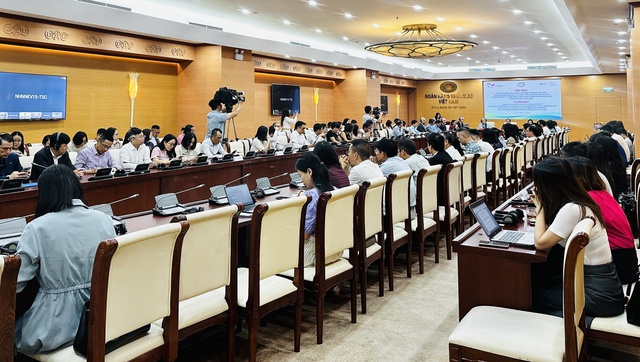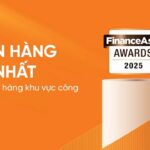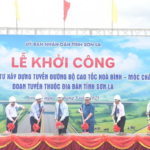The seminar on evaluating the implementation of the banking sector’s action plan for the National Green Growth Strategy for the period of 2021-2030, with a vision towards 2050, falls within the framework of the 2025 operational plan of the “Macroeconomic Reform – Green Growth Support Program” project for the 2023-2026 period. This is funded by the German government, according to the Memorandum of Understanding on cooperation between the SBV and IFC for the period of 2022-2026 regarding green growth and the development of the Vietnamese banking system, in line with the SBV’s orientation on green banking and the role of banking activities in sustainable development.
In his opening remarks at the seminar, Mr. Dao Minh Tu, SBV’s Deputy Governor, stated that in the face of the increasingly evident impacts of climate change and environmental degradation on economic development and social stability, green growth is no longer an option but a pressing necessity for countries worldwide, especially developing nations like Vietnam. Therefore, transitioning to a green growth model that balances economic development with environmental protection and efficient resource utilization is imperative for Vietnam to strive for a sustainable, inclusive, and prosperous future.
Over the years, the issue of green growth has received significant attention and promotion from the Vietnamese National Assembly and Government. They have set directions and goals for environmental protection and sustainable development, aligning with the country’s requirements and developmental conditions through various phases. This is evident in the National Green Growth Strategy for the periods of 2011-2020 and 2021-2030, with a vision towards 2050, and through Vietnam’s strong commitments to sustainable development and greenhouse gas emission reduction. These include Vietnam’s commitments at the United Nations Sustainable Development Summit, the Paris Agreement on Climate Change, and the net-zero emissions target pledged at COP26.
Notably, the National Strategy on Green Growth for the period of 2021-2030, with a vision towards 2050, aims to contribute to economic restructuring and growth model innovation. This strategy strives for economic prosperity, environmental sustainability, and social equity, moving towards a green economy, carbon neutrality, and contributing to the global effort to limit temperature rise. The Vietnamese government has also issued the Green Growth Action Plan, encompassing 18 themes, 57 task groups, and 134 specific activities for ministries, sectors, and localities. Regarding resources for implementing the strategy, in addition to the state budget and international mobilization, the government emphasizes the pivotal role of promoting green credit to meet the capital needs of the economic transition.
Recognizing the importance of bank credit in implementing the National Green Growth Strategy, Deputy Governor Dao Minh Tu mentioned that the SBV has been proactive since 2015. They integrated sustainable development goals into credit directive documents and issued directives to promote green credit and manage environmental and social risks in credit activities. The SBV has set requirements to gradually increase the proportion of green investment credit and develop green banking in the sector’s strategies and development proposals through solutions that enhance the entire industry’s awareness and capacity for green growth. Notably, in 2023, the SBV issued the Action Plan for the banking industry to implement the National Strategy on Green Credit for the period of 2021-2030 and Vietnam’s Action Plans on Climate Change. This comprehensive plan comprises seven groups of synchronous tasks for SBV units, State Bank branches, and credit institutions.
After nearly two years of implementing the industry’s action plan, significant positive results have been achieved. “There has been a marked change in the perception of sustainable development, with many credit institutions establishing steering committees for green and digital transformation and integrating green growth targets into their business strategies,” said the Deputy Governor. As of March 2025, 58 credit institutions had green credit balances (compared to only 15 in 2017), with an average green credit growth rate of over 21% during the 2017-2024 period, outpacing the overall credit growth rate for the economy. Additionally, 57 credit institutions conducted environmental and social risk assessments on a total outstanding balance of VND 3,620 trillion, a more than 15-fold increase compared to 2017. Many credit institutions have published sustainability reports, enhancing transparency and accountability, further solidifying their reputation and position.
However, Deputy Governor Dao Minh Tu candidly acknowledged the challenges faced in implementing the banking industry’s action plan. For instance, the implementation has been uneven, with many credit institutions not reporting to the SBV and not having green credit balances. Green credit outcomes have not met their full potential despite ample room for development due to the absence of a legal framework for a green list. The tools for risk assessment are limited, and green investment projects have long payback periods, making financial efficiency unclear. Moreover, mobilizing resources, especially international green finance, remains constrained.
Additionally, there are escalating demands for governance and human resource quality in the banking sector regarding environmental, social, and climate issues to identify, assess, manage, and monitor credit provisions. This also extends to providing advice and support to customers in meeting new international criteria on emissions. Overcoming these challenges requires not only the efforts of the banking industry but also the coordinated efforts of state management agencies and the sharing of experience and resources from international organizations.

Overview of the Seminar
According to the Deputy Governor, 2025 is a significant year for evaluating the five-year implementation of the National Green Growth Strategy for the period of 2021-2025. This also presents an opportunity for the banking industry to objectively and comprehensively assess its achievements, identify challenges and obstacles, and make necessary adjustments to enhance the effectiveness of the industry’s action plan. This will ultimately contribute to the success of the National Green Growth Strategy in the following phase.
In this spirit, the SBV, in collaboration with GIZ and IFC, organized the seminar “Promoting the Implementation of the Banking Industry’s Action Plan for the National Green Growth Strategy for the period of 2021-2030.” The event aimed to foster dialogue, exchange, and sharing of domestic and international experiences in green credit and green banking, thereby enhancing the capacity for effective green transformation in the Vietnamese banking industry. Notably, the credit institutions will benefit from the Handbook for the Environmental and Social Risk Management System in Credit Activities, jointly compiled by the SBV and IFC.
The Deputy Governor expected the experts and commercial banks to focus on four main topics. First, the implementation of the National Green Growth Strategy for the period of 2021–2030 by commercial banks, along with challenges and difficulties encountered, especially regarding institutional issues. Second, identifying investment targets and green investment portfolios, as well as incentives and support policies for businesses in green growth. Third, exploring the resources allocated by commercial banks for green credit. Fourth, clearly identifying the risks in implementing green credit to enable credit institutions to provide appropriate guidance and methods for deploying green credit. In this regard, the Deputy Governor emphasized the practicality of the Handbook for the Environmental and Social Risk Management System in Credit Activities, providing a “hands-on” guide for credit institutions to establish specific processes suited to their nature and loan characteristics.
Moving forward, the SBV looks forward to continued support from the German government, GIZ, IFC, and SECO in effectively implementing cooperation activities on sustainable finance and promoting the development of Vietnam’s banking system.
“FinanceAsia: SHB is Vietnam’s ‘Best Bank for Public Sector Clients’ in 2025”
Within the prestigious FinanceAsia Awards 2025, the Saigon-Hanoi Commercial Joint Stock Bank (SHB) has been recognized as the “Best Bank for Public Sector Clients” in Vietnam. This esteemed accolade celebrates SHB’s unwavering dedication to offering comprehensive and efficient financial solutions to public sector entities, standing as a testament to their commitment to fostering the country’s sustainable development.
Leaving Behind ‘Eradicating Hunger and Poverty’, It’s Time for the Nation to Race Towards Prosperity
Initiating a nationwide movement for a competitive and prosperous society is about unleashing everyone’s potential and igniting a spirit of healthy competition and economic development.
The IR Awards 2025: Unveiling Excellence
The IR Awards 2025 program, an event honoring listed companies with the best IR activities in 2025, has officially commenced. Now in its 15th year, the program is organized by Vietstock, in collaboration with the Vietnam Association of Financial Executives (VAFE) and the online magazine Finance and Life.





















